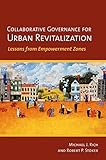Collaborative Governance for Urban Revitalization : Lessons from Empowerment Zones / Michael J. Rich, Robert P. Stoker.
Material type: TextPublisher: Ithaca, NY : Cornell University Press, [2014]Copyright date: ©2014Description: 1 online resource (296 p.) : 26 tables, 1 chart, 6 mapsContent type:
TextPublisher: Ithaca, NY : Cornell University Press, [2014]Copyright date: ©2014Description: 1 online resource (296 p.) : 26 tables, 1 chart, 6 mapsContent type: - 9780801470912
- Enterprise zones -- United States
- Urban renewal -- Government policy -- United States
- Urban renewal -- Georgia -- Atlanta
- Urban renewal -- Maryland -- Baltimore
- U.S. History
- Urban Studies
- SOCIAL SCIENCE / Sociology / Urban
- policy success, policy failure, federal block grants, sustainable community development, poverty and development, urban development
- 307.34160973 23
- HT175 .R53 2016
- online - DeGruyter
| Item type | Current library | Call number | URL | Status | Notes | Barcode | |
|---|---|---|---|---|---|---|---|
 eBook
eBook
|
Biblioteca "Angelicum" Pont. Univ. S.Tommaso d'Aquino Nuvola online | online - DeGruyter (Browse shelf(Opens below)) | Online access | Not for loan (Accesso limitato) | Accesso per gli utenti autorizzati / Access for authorized users | (dgr)9780801470912 |
Frontmatter -- Contents -- Preface -- Introduction -- 1. Federal Aid and the Cities -- 2. Good Governance -- 3. Revitalization Strategies and Programs -- 4. Local Governance Structures and Processes -- 5. What Happened in EZ Neighborhoods? -- 6. Atlanta’s Empowerment Zone -- 7. Baltimore’s Empowerment Zone -- 8. Explaining Revitalization Outcomes -- Conclusion -- Notes -- References -- Index
restricted access online access with authorization star
http://purl.org/coar/access_right/c_16ec
For more than one hundred years, governments have grappled with the complex problem of how to revitalize distressed urban areas. In 1995, the original urban Empowerment Zones (Atlanta, Baltimore, Chicago, Detroit, New York, and Philadelphia) each received a $100 million federal block grant and access to a variety of market-oriented policy tools to support the implementation of a ten-year strategic plan to increase economic opportunities and promote sustainable community development in high-poverty neighborhoods. In Collaborative Governance for Urban Revitalization, Michael J. Rich and Robert P. Stoker confront the puzzle of why the outcomes achieved by the original Empowerment Zones varied so widely given that each city had the same set of federal policy tools and resources and comparable neighborhood characteristics.The authors' analysis, based on more than ten years of field research in Atlanta and Baltimore and extensive empirical analysis of EZ processes and outcomes in all six cities shows that revitalization outcomes are best explained by the quality of local governance. Good local governance makes positive contributions to revitalization efforts, while poor local governance retards progress. While policy design and contextual factors are important, how cities craft and carry out their strategies are critical determinants of successful revitalization. Rich and Stoker find that good governance is often founded on public-private cooperation, a stance that argues against both the strongest critics of neoliberalism (who see private enterprise as dangerous in principle) and the strongest opponents of liberalism (who would like to reduce the role of government).
Mode of access: Internet via World Wide Web.
In English.
Description based on online resource; title from PDF title page (publisher's Web site, viewed 26. Apr 2024)


